If you are craving a fun indian snack bursting with crispiness, spice, sweetness, and tang, all at once, treat yourself to a plate of papri chaat (also known as papdi chaat). Made with crispy papris, boiled potatoes, smooth chilled yogurt, an array of indian chutneys, and chaat spices, papri chaat is a burst of flavors and textures in every bite!
Papri are comparable to crackers and are usually flavored with ajwain(carrom seeds). In this post, I am also teaching you how to make these delightful crisp Indian-style crackers, right in your own kitchen. But don't hesitate to choose store-bought papris if you're short on time.

Chaat is popular street food served at roadside stalls in India. The best part about indian street food is that it is deeply personalisable. Simply tell the chaatwala (vendor) about your preferred taste and he'll tailor your chaat plate to your taste buds, whether you prefer it spicy, tangy, salty, or hot.
Papdi chaat is the king of street food scene in Delhi. Growing up, it used to be our weekend ritual to hit up the chaat stalls and dig into some aloo tikki chaat & papri chaat. I mean, who could resist those bursts of flavors and textures? It's just one of those things you can't say no to!
Homemade Papri
Before I dive into homemade papri, I got to admit that most of the time, I use store-bought ones. They're just so easy to grab, and honestly, some of the options at Indian grocery stores these days taste pretty darn good.
But when it's festival time or some special occasion, I like to roll up my sleeves and make papri from scratch. It's something I remember from my childhood days, you know? Back then, buying papris from the store was rare – maybe it was my grandma's stubbornness, but she always insisted on making them at home.
She was a pro at whipping up papris at home, and let me tell you, if you put in the effort to make them from scratch, this papdi chaat hits a whole new level of deliciousness!
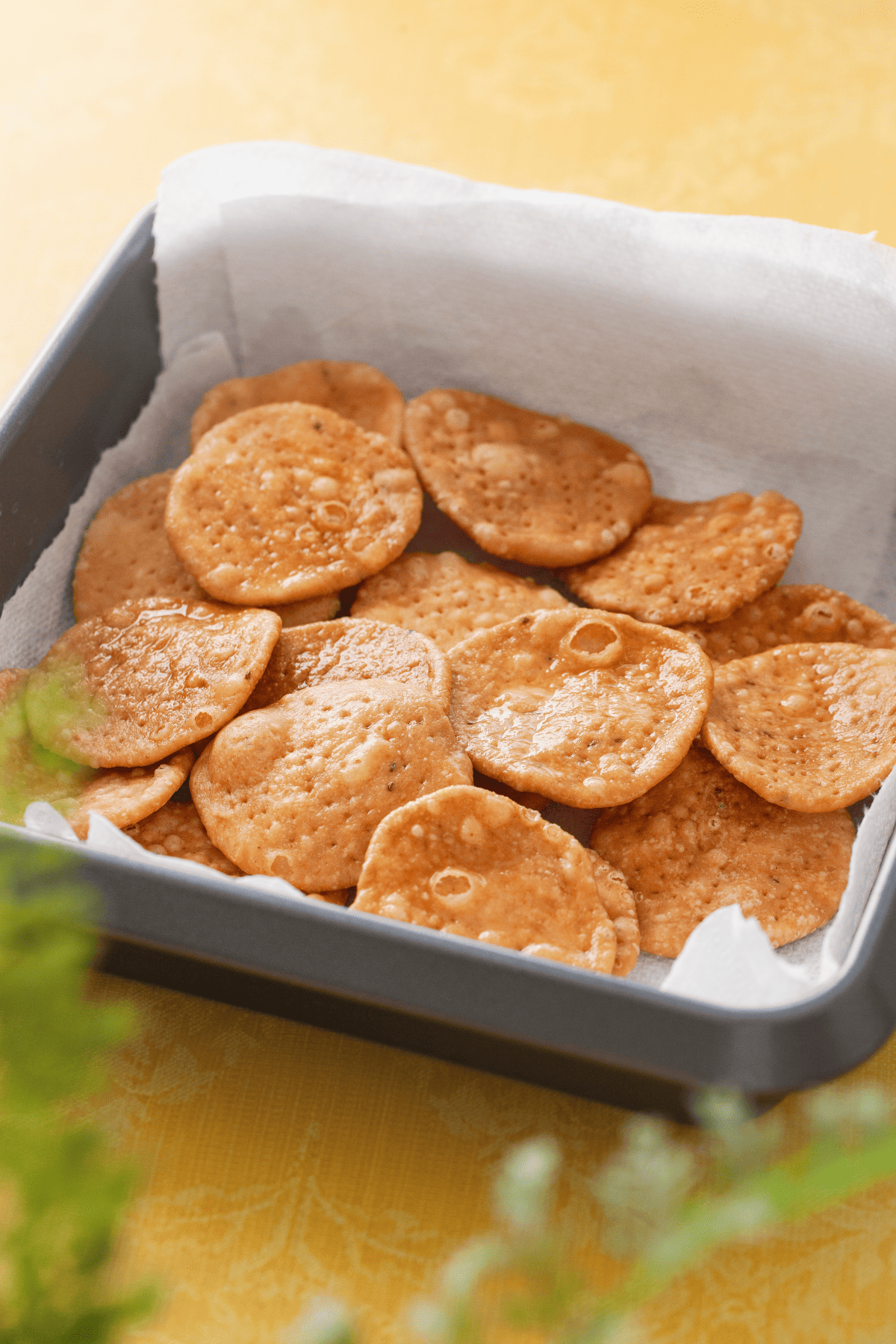
Making papris at home is not difficult but yes, they take time and effort. Sometimes, I can still picture those afternoons when when she'd meticulously pour oil over the flour mix, her experienced hands and eyes working together. She had this knack for adding the right amount of moyan (oil) to achieve that perfect khasta (flaky) texture for her papris. In homemade indian pastries such as mathri,kachoris , moyan is the key to success. You can read all about moyan in my atta mathri post.
In one word, your papris should be khasta, meaning a crisp & flaky texture. You can make papris weeks in advance. Just fit them into your schedule whenever you have a bit of free time. I find working with dough quite therapeutic. And the best part? These papris stay crispy for weeks on end. Keep stored in air tight container. I stick to deep frying them for that authentic, traditional flavor – haven't experimented with baking or air frying yet.

Play With Chaat Toppings
When it comes to topping your papri chaat, the options are endless! You could choose boiled chana (white chickpeas), boiled matra (dried white peas), onions, tomatoes, crispy sev (thin gram flour noodles), green chillies, grated beets & radishes, and so much more.
Personally, simple toppings is what works best for me. I top mine with boiled potatoes, sweet yogurt (meetha dahi), green chutney, sweet tamarind chutney (imli chutney), chaat spices, and a scatter of juicy pomegranate seeds. This combo takes me right back to papri plates of my childhood.
Whichever toppings you choose, let me tell you, dahi (yogurt) and aloo (boiled potatoes) are non-negotiables for the perfect papri chaat – you just can't skip 'em! For this reason, it is also called dahi papdi chaat.

How To Make Papri
Skip these steps if you are using store bought papri.
Make Papri Dough
- In a large mixing bowl, mix together flour, fine semolina, ajwain & salt.
- Start with 1 tablespoon of melted ghee and start working it into the mixture. The idea is to moisten the flour with ghee so that the papri turn out khasta(crispy & flaky). The flour should feel powdery, rather smooth as you add ghee.


- Keep on adding ghee slowly a teaspoon at a time after it & working it into the flour till you are just able to form a firm ball of the flour using your palm & finger.This process is called checking "moyan ".


- Next, slowly add the water (¼ cup to begin with) and start kneading the dough. We are looking for a firm dough here (not soft & pliable, not hard). Knead the dough using your kunckles for about 3-4 minutes. The dough should not feel dry or tight.


- Transfer the dough back to the bowl, cover with a damp cloth & let rest for at least 30 minutes. You can rest the dough up to 1 hour. (do not skip resting).


Roll & Fry Papri
You can roll the papris in a couple ways.Use any one of the below methods to roll the papri.
- 1st Method (My preferred method) -Divide the rested dough into small portions (about 22-24).Take each portion and roll into a smooth ball between your palms. Keep the dough balls covered with a damp cloth at all times.
- On a rolling surface, roll each dough ball into a 2 inch circle. The thickness should be thin as a muslin cloth (kind of transparent, see image below). Don't use any dry flour while rolling. If needed, use oil while rolling.



- Prick the rolled papri all over with a fork to prevent puffing while frying. We dont want papri to puff like poori. Keep the rolled papri in a single layer covered with a damp cloth.


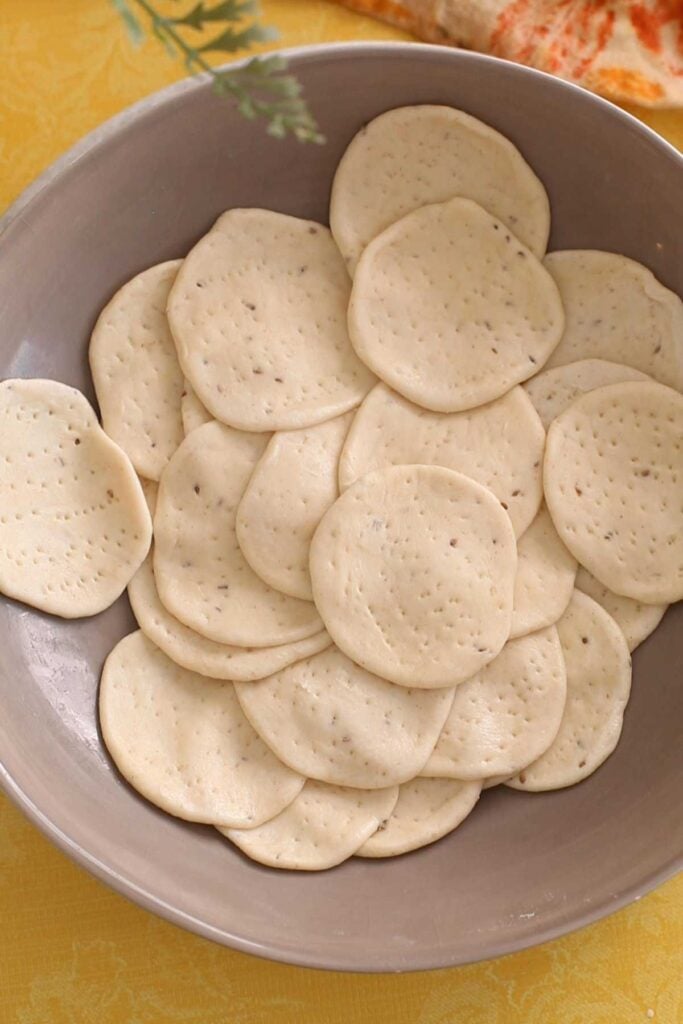
- 2nd Method - Divide the dough into two portions. Take one part and roll it into a thin sheet.Again, the sheet should be rolled as thin as a muslin cloth.
- Once rolled, prick the rolled dough all over with a fork to prevent puffing while frying. Use a 2 inch round cookie cutter or a jar lid to cut into round shapes.
- Transfer the rounds to a plate & place covered with damp cloth till you are about to fry. Gather the remaining dough & repeat rolling & cutting till whole of the dough is exhausted. Repeat the same for entire dough.
- Frying - Heat 2-3 cup oil in a deep pot on medium heat. The quantity of oil used should be enough to cover the papri completely while they fry. To check the temperature of oil, pinch a little dough & drop it into the heating oil. The dough should sizzle to the top slowly without changing color. If it sizzles immediately, reduce the heat & let the oil temperature come down.


- Add the papris into the heated oil, a few at a time. Do not overcrowd. Fry on medium-low heat until both sides are golden brown (about 3-5 minutes). Papris should be fried at medium- low heat else they will become soft after cooling.
- Remove browned papris with a slotted spoon and transfer to a plate lined with a paper towel to soak up excess oil. Fry all the papri in a similar way in batches.
- Cool completely & immediately store in an air tight container for up to 4 weeks.


How To Make Papri Chaat
- Peel the boiled potatoes and dice small. Add to a bowl and sprinkle a bit of salt to season them. You could add red chilli powder or chaat masala to potatoes too.
- In another bowl, whisk yogurt with little sugar and kala namak (indian black salt). Taste and adjust as you like. Gather the green chutney and tamarind chutneys.
- Dip each papri in yogurt and place in a wide plate. Sprinkle chaat masala and roasted cumin powder. I do 5-6 papri per serving or you can make a large plate if serving family style.

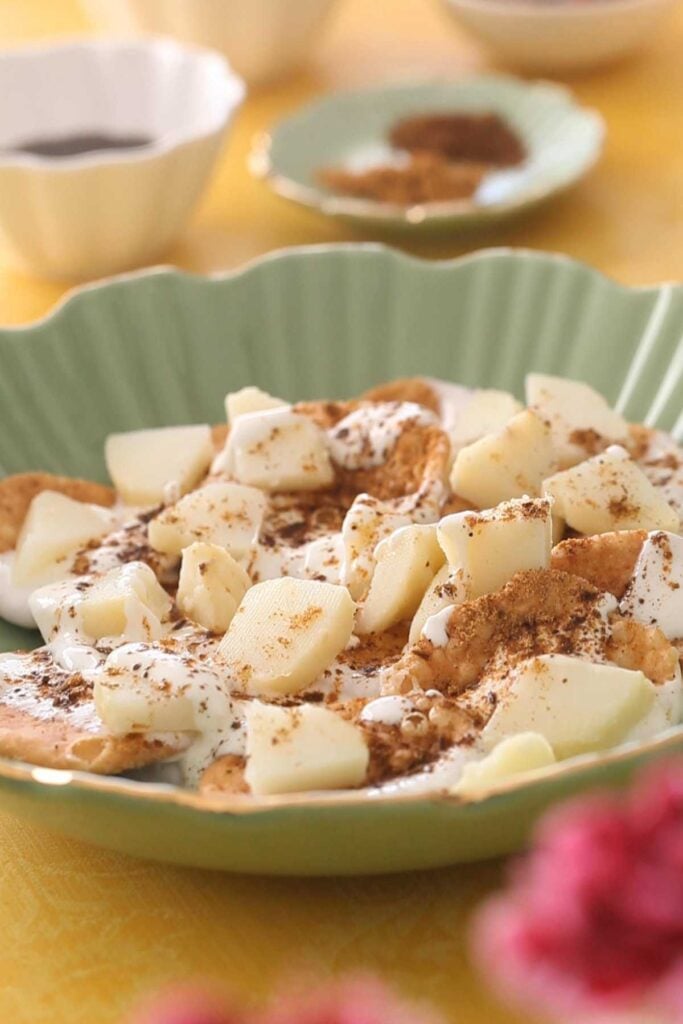
- Top with boiled potatoes. Sprinkle chaat masala and roasted cumin powder again. Season at every stage for amazing punch! Drizzle yogurt, coriander chutney and tamarind chutney. Add chopped onions and green chillies if you wish. Sprinkle chaat masala and roasted cumin powder. You could also add red chili powder.
Tip - Chaat is all about visual appeal. Usually, I start with light colored ingredients such as yogurt and potatoes followed by green chutney and dark brown imli chutney. Sprinkle chaat masala and bhuna jeera in a manner that a little falls on the yogurt. This makes for an appealing visual contrast. Add the fresh ingredients such as pomegranate and coriander leaves at the very top.
- Top up with chopped cilantro,and pomegranate arils. Serve papri chaat rightaway!


Make Ahead Tips
You can make all the components ahead and store. Make papdis 2-3 weeks in advance. Boil the potatoes and store them. Prepare the green chutney and imli chutney and keep refrigerated. You can also whisk the yogurt with sugar and salt and store in fridge. With all the components ready to go, its just a matter of minutes before you arrange a papdi chaat plate.

Recipe Tips
- For perfectly crispy and flaky papri, avoid over-kneading the dough, and fry them until golden brown and crunchy.
- Vegan Version - If you are making papri at home, use plant based oil instead of ghee for moyan. Use plant based yogurt instead of regular yogurt. My green chutney recipe has yogurt mixed in it, omit the yogurt while making green chutney.
- The conistency of yogurt and both chutneys should be thick yet flowing. They yogurt should coat the papdi without dripping and you should be able to drizzle chutney.
- While layering papri chaat, keep the visual appeal I talked about earlier in mind.
- Think layers of texture while deciding on which toppings to inlcude for the best bite! aim for a balance of sweet, sour, and spicy flavors in your chaat. Accordingly, adjust the amount of chutneys and spices.
- Serve chilled - Papdi chaat is best served and enjoyed chillied. Make sure that your potatoes are cold. Use chilled yogurt.

Papri Chaat
Ingredients
For Homemade Papri (Skip if using Store Bought Papri)
- ¾ cup (~115g) all-purpose flour maida
- 1.5 tablespoon fine semolina sooji
- ¼ teaspoon ajwain carrom seeds
- 1.5 to 2 tablespoon melted ghee or as needed
- ½ teaspoon salt
- 7-8 tablespoon water or as needed, room temperature
- oil for deep frying
For Papri Chaat (Serves 3)
- 1 large potato boiled, peeled & diced small
- ¼ teaspoon roasted cumin powder bhuna jeera powder
- ½ teaspoon chaat masala adjust quantity to taste
- 3 tablespoon tamarind chutney adjust quantity to taste
- 2 tablespoon green chutney adjust quantity to taste
- 2 tablespoon pomegranate seeds
For Yogurt
- ½ cup plain yogurt not too sour, I use whole milk greek yogurt
- 1 tablespoon sugar adjust quantity to taste
- ½ teaspoon kala namak indian black salt, adjust quantity to taste
Instructions
Make Papri Dough (Skip this step if using store bought papri)
- In a large mixing bowl, mix together flour, fine semolina, ajwain & salt.
- Start with 1 tablespoon of melted ghee and start working it into the mixture. The idea is to moisten the flour with ghee so that the papri turn out khasta(crispy & flaky). The flour should feel powdery, rather smooth as you add ghee.
- Keep on adding ghee slowly a teaspoon at a time after it & working it into the flour till you are just able to form a firm ball of the flour using your palm & finger.This process is called checking "moyan ".
- Next, slowly add the water (¼ cup to begin with) and start kneading the dough. We are looking for a firm dough here (not soft & pliable, not hard). Knead the dough using your kunckles for about 3-4 minutes. The dough should not feel dry or tight.
- Transfer the dough back to the bowl, cover with a damp cloth & let rest for at least 30 minutes. You can rest the dough up to 1 hour. (do not skip resting).
Roll & Fry Papri
- You can roll the papris in a couple ways. Use any one of the below methods to roll the papri.1st Method -Divide the rested dough into small portions (about 22-24).Take each portion and roll into a smooth ball between your palms. Keep the dough balls covered with a damp cloth.On a rolling surface, roll each dough ball into a 2 inch circle. The thickness should be thin as a muslin cloth (kind of transparent). Dont use any dry flour while rolling. If needed, use oil while rolling. Prick the rolled papri all over with a fork to prevent puffing while frying. We dont want papri to puff like poori. Keep the rolled papri covered with a damp cloth.
- 2nd Method - Divide the dough into two halves. Take one part and roll it into a thin sheet.The sheet should be rolled as thin as a muslin cloth. Once rolled, prick the rolled dough all over with a fork to prevent puffing while frying. Use a round cookie cutter or a jar lid to cut into round shapes. Transfer the rounds to a plate & place covered with damp cloth till you are about to fry. Gather the remaining dough & repeat rolling & cutting till whole of the dough is exhausted. Repeat the same for entire dough. Keep the rolled papri covered with a damp cloth.
- Heat 2-3 cup oil in a deep pot on medium heat. The quantity of oil used should be enough to cover the papris completely while they fry. To check the temperature of oil, pinch a little dough & drop it into the heating oil. The dough should sizzle to the top slowly without changing color. If it sizzles immediately, reduce the heat & let the oil temperature come down.
- Add the papris into the heated oil, a few at a time. Do not overcrowd. Fry on medium-low heat until both sides are golden brown (about 3-5 minutes). Papris should be fried at medium- low heat else they will become soft after cooling.
- Remove browned papris with a slotted spoon and transfer to a plate lined with a paper towel to soak up excess oil. Fry all the papri in a similar way in batches.
- Cool completely & store in an air tight container for up to 4 weeks
Assemble Papri Chaat
- Peel the boiled potatoes and dice small. Add to a bowl and sprinkle a bit of salt to season them. You could add red chilli powder or chaat masala to potatoes too.
- In another bowl, whisk chilled yogurt with little sugar and kala namak (indian black salt). Taste and adjust as you like. Gather the green chutney and tamarind chutneys.
- Dip each papri in yogurt and place in a wide plate. Sprinkle chaat masala and roasted cumin powder. I do 5-6 papri per serving or you can make a large plate if serving family style.
- Top with boiled potatoes. Sprinkle chaat masala and roasted cumin powder again. Season at every stage for amazing punch! Drizzle yogurt, coriander chutney and tamarind chutney. Add chopped onions and green chillies if you wish. Sprinkle chaat masala and roasted cumin powder. You could also add red chili powder.
- Top up with chopped cilantro,and pomegranate arils.Serve rightaway.
Notes
- For perfectly crispy and flaky papri, avoid over-kneading the dough, and fry them until golden brown and crunchy.
- Vegan Version - If you are making papri at home, use plant based oil instead of ghee for moyan. Use plant based yogurt instead of regular yogurt. My green chutney recipe has yogurt mixed in it, omit the yogurt while making green chutney.
- The conistency of yogurt and both chutneys should be thick yet flowing. They yogurt should coat the papdi without dripping and you should be able to drizzle chutney.
- Think layers of texture while deciding on which toppings to inlcude for the best bite! aim for a balance of sweet, sour, and spicy flavors in your chaat. Accordingly, adjust the amount of chutneys and spices.
- Serve chilled - Papdi chaat is best served and enjoyed chillied. Make sure that your potatoes are cold. Use chilled yogurt.


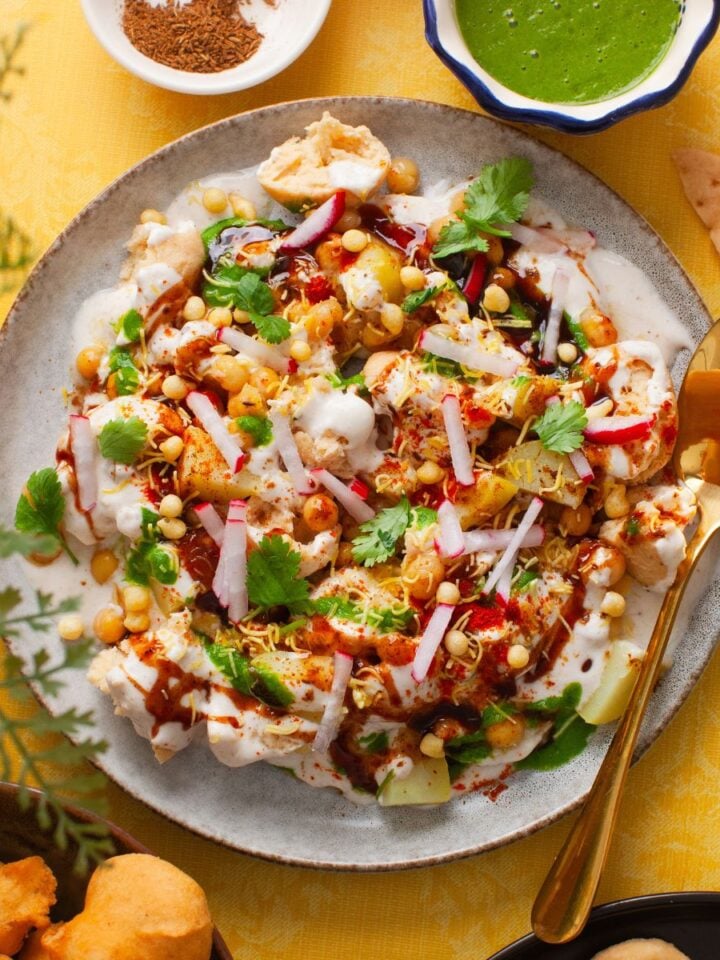
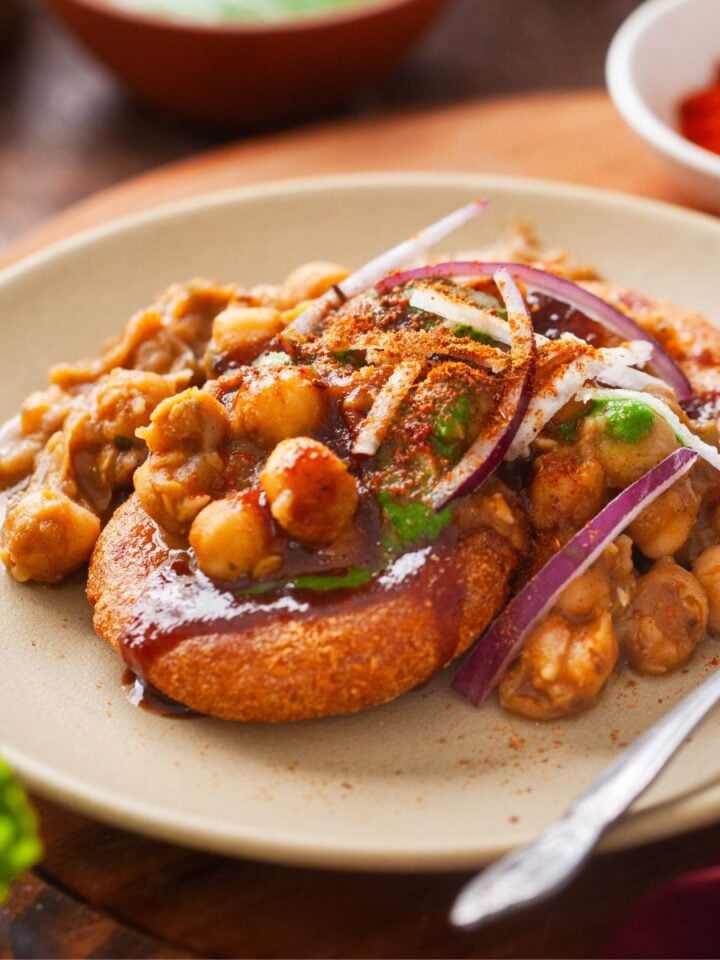


Sarmishta
I love, love, love your blog and I've been a frequent follower of your posts. Thanks so much for sharing especially this particular recipe that takes me back instantly, and its hard to parallel this experience outside of India, otherwise. I made great papdis the first time (I think by fluke ;)) but the second time around they failed and softened too soon. I re-read your recipe and followed every word the third time, and I can't be more grateful for the amount of detail you've put in to explain it. It came out perfect and I think I'm all set for the next time too 😉 Thanks so much again for sharing!